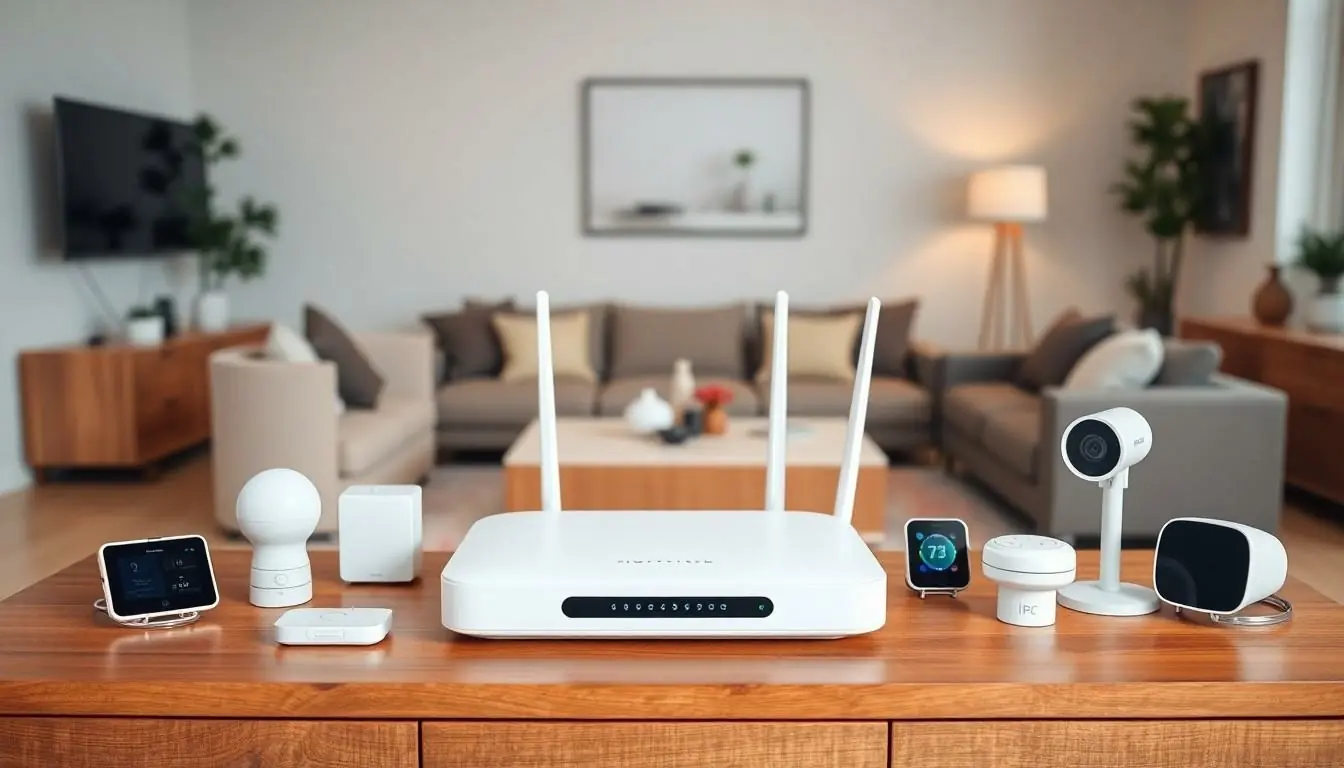Table of Contents
ToggleIn a world buzzing with smart gadgets, the IoT router stands out like a superhero in a sea of sidekicks. It’s not just a router; it’s the brain behind your connected home, ensuring everything from your coffee maker to your cat’s collar works in perfect harmony. Imagine a life where your devices chat seamlessly, and your Wi-Fi signal is as strong as your morning coffee—no more buffering during that crucial cat video!
Overview of IoT Routers
IoT routers play a vital role in modern smart homes, serving as the backbone for device communication. These routers ensure that all connected devices transmit data smoothly and efficiently.
Definition of IoT Router
An IoT router is a specialized networking device designed for managing Internet of Things connections. It facilitates the communication between multiple smart devices, enabling them to interact with one another and with the internet. By using advanced protocols and security measures, an IoT router optimizes data flow, supporting varying device requirements.
Importance of IoT Routers in Modern Networks
IoT routers enhance the functionality of smart home environments. They support scalable networks, allowing users to easily integrate new devices. A robust Wi-Fi connection maintains reliable communication, reducing latency and preventing disruptions. Furthermore, IoT routers feature enhanced security protocols, mitigating risks associated with device vulnerabilities. Ultimately, they pave the way for seamless home automation while managing network traffic effectively.
Features of IoT Routers

IoT routers possess unique features that significantly enhance the functionality of smart home networks. These features include advanced connectivity options, robust security protocols, and scalability that support growing device ecosystems.
Connectivity Options
Multiple connectivity options define the capability of IoT routers. These devices often support Wi-Fi, Zigbee, Z-Wave, and Bluetooth. Wi-Fi provides high-speed internet access for devices that require it. Zigbee and Z-Wave facilitate low-power communication among smart devices, ideal for battery-operated gadgets. Additionally, Bluetooth enables short-range connections. These diverse options ensure seamless integration for various devices while enhancing overall network performance.
Security Protocols
High-level security protocols are essential in IoT routers. These routers utilize encryption standards such as WPA3 to protect data transmissions. Firewalls often come built-in, adding another layer of defense against potential threats. Regular software updates help maintain security against vulnerabilities. Acting proactively, some models incorporate intrusion detection systems. These features work together to ensure a secure network environment for smart home devices.
Scalability and Management
Scalability stands out as a critical feature of IoT routers. These devices allow users to add new smart devices without compromising network performance. Management capabilities often include user-friendly apps for monitoring and controlling connected devices. Prioritizing traffic ensures that critical devices receive the necessary bandwidth. Some routers also support mesh networking, improving coverage in larger homes. Together, these aspects provide flexibility, making IoT routers essential for expanding smart home setups.
Popular IoT Router Models
Numerous IoT router models excel in providing robust connectivity for smart homes. These devices enhance communication, security, and scalability for a variety of connected gadgets.
ASUS ZenWiFi AX (XT8)
ASUS ZenWiFi AX (XT8) stands out with its tri-band technology, delivering robust signal strength throughout larger homes. This model supports Wi-Fi 6, which enables faster data transfer rates and reduced latency. It seamlessly integrates multiple smart home devices, ensuring stable connections without interruption. Security features include advanced parental controls and AiProtection Pro, which safeguards users from various online threats. Its user-friendly app allows for easy management of connected devices and network settings.
TP-Link Deco X90
TP-Link Deco X90 combines dual-band capabilities with intelligent mesh technology, creating expansive and strong coverage. This model supports up to 200 connected devices, making it suitable for extensive smart ecosystems. Each unit offers up to 6,000 square feet of coverage, which eliminates dead zones in the home. Advanced security measures include TP-Link HomeCare, addressing potential vulnerabilities. The Deco app facilitates straightforward setup and monitoring of network traffic, enhancing control over smart devices.
Netgear Orbi RBK852
Netgear Orbi RBK852 features a powerful dual-band system designed for larger homes with demanding smart home setups. It supports Wi-Fi 6 and delivers speeds of up to 6 Gbps, allowing seamless streaming and gaming experiences. This router is capable of handling over 100 devices, making it ideal for families with many connected gadgets. Alongside robust security features, it includes automatic firmware updates to maintain optimal protection. The Orbi app simplifies installation and customization, ensuring straightforward management of the network.
Use Cases for IoT Routers
IoT routers serve various functions across different environments. Their versatility enhances connectivity and improves efficiency in numerous applications.
Smart Home Applications
In smart homes, IoT routers connect a wide range of devices like security cameras, smart thermostats, and lighting systems. These routers facilitate real-time communication among gadgets, allowing users to control their home environment through mobile apps. Enhanced data encryption protects user information, ensuring privacy and security. Devices can operate without lag, leading to smoother automation experiences. Popular smart home ecosystems thrive on reliable IoT router functionality, making them essential for effortless daily living.
Industrial IoT Implementations
Industrial sectors leverage IoT routers for real-time data collection and monitoring. Factories deploy these routers to link sensors, machinery, and control systems, optimizing production processes. Efficiency improves as real-time analytics enable predictive maintenance, reducing downtime. Data-driven decisions enhance productivity, ultimately lowering operational costs. Advanced security protocols safeguard industrial networks, protecting sensitive information and preventing unauthorized access. IoT routers play a crucial role in digital transformation within manufacturing environments.
Smart Cities
Smart cities utilize IoT routers to integrate and manage urban services. Traffic lights, waste management systems, and public transportation become interconnected, creating efficient monitoring and control systems. These routers gather data from various sources, allowing city officials to address issues in real time. Improved resource management enhances citizen services, leading to a better quality of life. Sustainable urban development benefits from the seamless communication enabled by IoT routers. Their role in creating smarter infrastructure continues to evolve as cities grow and modernize.
The IoT router stands at the forefront of modern connectivity, transforming how smart devices interact within homes and beyond. Its advanced features ensure that users can enjoy seamless communication while maintaining robust security. As technology continues to evolve, the importance of IoT routers will only grow, enabling smarter homes, efficient industries, and improved urban living.
Investing in a quality IoT router not only enhances the smart home experience but also prepares users for the future of connected living. With the right device, individuals can unlock the full potential of their smart ecosystems, ensuring a harmonious and efficient network for all their connected needs.







